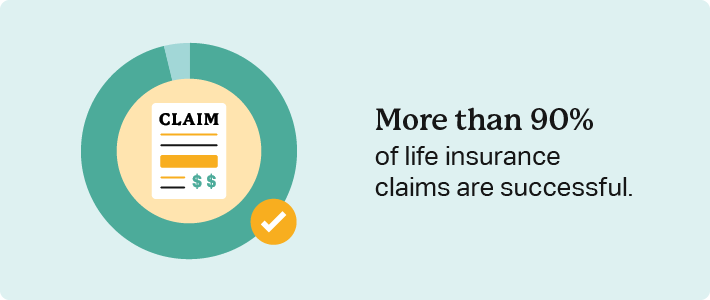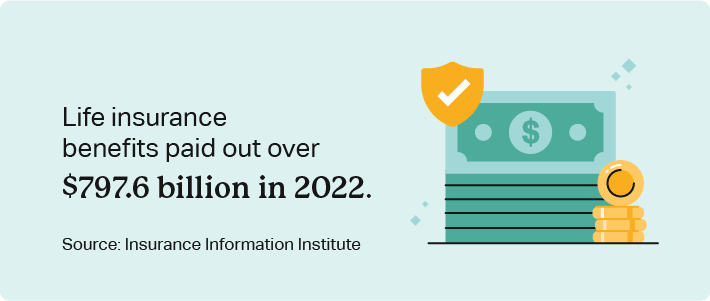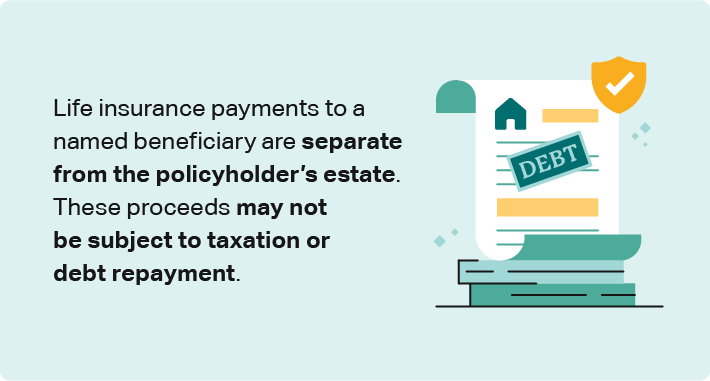Very few life insurance claims are denied, and companies have paid out more than $1.1 trillion in benefits over the last 20 years. But the cash benefit isn’t automatic. First, someone has to determine if the deceased has a life insurance policy and file a claim with the provider.
Sometimes, families don’t know about a policy and skip this important step after someone dies. If the insurance provider isn’t aware of a policyholder’s death, the benefits remain unclaimed and may be turned over to the state.
Communication is key, so talk to your loved ones about their financial assets and estate planning. Meanwhile, here are five ways to find out if someone has life insurance and additional guidance once you’ve located a policy.
1. Use Life Insurance Policy Locators
There are several online tools that perform a life insurance policy search with a Social Security number or other personal details. The National Association of Insurance Commissioners (NAIC) free Life Policy Locator should be your first stop.
The process is simple. First, enter your personal contact information. Then you’ll share the deceased’s death certificate information, including their:
- Social Security Number.
- Date of birth.
- Date of death.
- Legal name.
- Veteran status.
- Relationship to yourself.
The company will contact you directly if they discover a match.
Estate executors or the closest living relative can also search the MIB Policy Locator Service for life insurance policies. This service searches life insurance applications but can’t confirm whether a policy was issued or is currently active.
The MIB search requires you to mail:
- A notarized and complete application.
- An original death certificate.
- A $75 payment via money order or certified check.
Finally, you can search for unclaimed property, including a life insurance policy, through the National Association of Unclaimed Property Administrators website and Missing Money.
2. Talk To Friends And Family
The deceased’s loved ones may know about existing life insurance policies. If they know where the deceased stored personal documents, which insurance companies they worked with, or likely beneficiaries, you can use these specifics to track the policy details.
3. Contact Professional Advisors
Several professional advisors may have access to insurance information and can help you find out who to talk to next. Knowing the deceased’s insurance agent is the easiest way to find policy details, and they’ll help you file a claim once you confirm your identity.
The deceased’s estate lawyer, financial professionals like accountants or tax advisors, or former employers may also have documentation for existing insurance policies.
4. Look Through Personal Documents
If all else fails, dig through personal records to find insurance contract details. People commonly store paper files in desks, file cabinets, financial binders, or safes.
Don’t forget to check digital files, too. If you can access the deceased’s personal computer, you can search phrases like “life insurance company” or “certificate of insurance” to find saved files. You can also search saved emails or bank statements for payment confirmations or specific insurance companies to contact.
5. Search State Registries
Unclaimed benefits are eventually transferred to the policyholder’s state of residence. Find your state registry at unclaimed.org, then submit the deceased’s personal information to find unclaimed property.
Who Can Access Existing Life Insurance Policies?
Just because you discovered an existing policy doesn’t mean you can access the policy details or file a claim. Only the following relationships may have access to the deceased’s policy:
- Next of kin (E.g., spouse, child).
- Named beneficiaries.
- Executors and trustees.
Life insurance policies often name a specific beneficiary to receive the insurance benefit or the payout is applied to the estate. Beneficiaries receive life insurance proceeds separate from the estate, so they can receive the full benefit to spend as they like.
Policies without a named beneficiary are considered part of the policyholder’s estate. The proceeds are distributed according to the policyholder’s wishes outlined in a will or estate planning document. The benefit may be subject to taxation or used to contribute to the estate’s outstanding debts.
How To Find Out If You’re A Policy Beneficiary
Contact the deceased’s life insurance company to confirm if you’re a designated beneficiary. The insurance company will help you confirm the policyholder’s death and file a claim.
If you’re not a designated beneficiary, you won’t receive any additional information from the insurance company. However, the insurance company can contact the policyholder’s beneficiaries now that they’re aware of the death.
How To Claim Life Insurance Death Benefits
You only need a certified, original death certificate to begin filing a life insurance claim as an executor, beneficiary, or next of kin. This confirms the policyholder’s death so the company can pay out the death benefit.
You’ll submit the death certificate and the required paperwork provided by the life insurance company. Then the beneficiaries will clarify how they want to be paid and provide all necessary personal details to the insurance company.
What Happens To Unclaimed Benefits?
Life insurance companies don’t automatically receive death records, so benefits may go unclaimed if the deceased’s loved ones don’t share a death certificate. Though companies are often required by state law to regularly review the Social Security Administration’s Death Master File to identify clients who have passed and make a good-faith effort to contact their beneficiaries.
Unclaimed benefits remaining after the company completes these steps are forfeited to the state — often after several years. These benefits are then listed on the state’s unclaimed property registry for loved ones to search and submit a claim.
Frequently Asked Questions
If you’re searching for an insurance policy a loved one got ages ago, the insurance company could’ve been bought out, switched names, or even closed up shop since then. A quick Google search might do the trick to figure out the situation, but if you’re still in the dark, reach out to your state’s insurance department for more details.
Yes, it’s possible, and in such cases, you’ll have to reach out to the insurance provider to claim the benefits upon the insured individual’s death. If you suspect you might be the designated beneficiary of a life insurance policy, you can use life insurance policy locators to try to confirm the information.
Life insurance companies typically won’t automatically reach out to inform you that you’re a beneficiary after someone passes away. It’s a good idea to be proactive and contact the insurer yourself to ensure you have all the details you need during such a challenging time.
Burial Insurance For Your Family’s Financial Future
Life policies like burial expense insurance guarantee that your end-of-life expenses are covered, and your family can grieve without the financial burden of sudden funeral costs.
Just ensure you alert your beneficiaries and loved ones of any existing policies so they don’t have to figure out how to find out if someone has life insurance on their own.
- Nationally licensed life insurance agent with over 15 years of experience
- Personal annual production that puts him in the top .001% out of all life insurance agents in the nation.
Anthony Martin is a nationally licensed insurance expert with over 15 years of experience and has personally served over 10,000 clients with their life insurance needs. He frequently authors entrepreneurial and life insurance content for Forbes, Inc.com, Newsweek, Kiplinger, and Entreprenuer.com. Anthony has been consulted as an expert life insurance source for dozens of high-profile websites such as Forbes, Bankrate, Reuters, Fox Business, CNBC, Investopedia, Insurance.com, Yahoo Finance, and many more.
- Nationally licensed life insurance agent with over 19 years of experience
- Best selling Amazon author.
Jeff Root is a nationally licensed life insurance expert with over 19 years of experience. He has personally helped over 3000 clients with their life insurance needs. Jeff is a best-selling Amazon author and the managing partner of a highly successful insurance brokerage that manages over 2,500 licensed insurance agents across the USA. He has been a featured life insurance source for prestigious websites such as Forbes, Bloomberg, MarketWatch, Nerdwallet, and many more.
- Nationally licensed life insurance agent with over 14 years of experience
- Best selling Amazon author of five insurance sales books.
David Duford is a nationally licensed insurance expert with over 14 years of experience. He has personally helped more than 15,000 clients buy life insurance. David has been featured as an expert source for highly authoritative publications such as A.M. Best and Insurancenewsnet. He also runs one of the largest Youtube channels to help aspiring insurance agents serve their clients better.
- Nationally licensed life insurance agent with over 19 years of experience
- Best selling Amazon author.
Jeff Root is a nationally licensed life insurance expert with over 19 years of experience. He has personally helped over 3000 clients with their life insurance needs. Jeff is a best-selling Amazon author and the managing partner of a highly successful insurance brokerage that manages over 2,500 licensed insurance agents across the USA. He has been a featured life insurance source for prestigious websites such as Forbes, Bloomberg, MarketWatch, Nerdwallet, and many more.
- Nationally licensed life insurance agent with over 14 years of experience
- Best selling Amazon author of five insurance sales books.
David Duford is a nationally licensed insurance expert with over 14 years of experience. He has personally helped more than 15,000 clients buy life insurance. David has been featured as an expert source for highly authoritative publications such as A.M. Best and Insurancenewsnet. He also runs one of the largest Youtube channels to help aspiring insurance agents serve their clients better.
Choice Mutual often cites third-party websites to provide context and verification for specific claims made in our work. We only link to authoritative websites that provide accurate information. You can learn more about our editorial standards, which guide our mission of delivering factual and impartial content.
-
more than $1.1 trillion in benefits. https://www.iii.org/article/fact-sheet-unclaimed-life-insurance-policies
-
Life Policy Locator. https://eapps.naic.org/life-policy-locator/#/welcome
-
MIB Policy Locator Service. https://www.mib.com/pls.html
-
National Association of Unclaimed Property Administrators. https://unclaimed.org/
-
Missing Money. https://missingmoney.com/
-
file a claim. https://www.iii.org/publications/triple-i-insurance-facts/life-annuity-financial-data/benefits-and-claims
-
unclaimed.org. https://unclaimed.org/search/
-
Social Security Administration's Death Master File. https://www.ssa.gov/dataexchange/request_dmf.html











